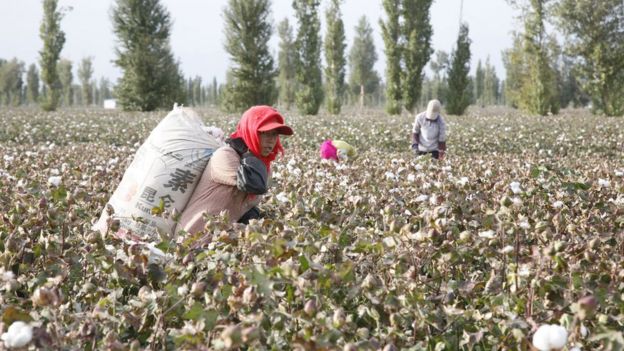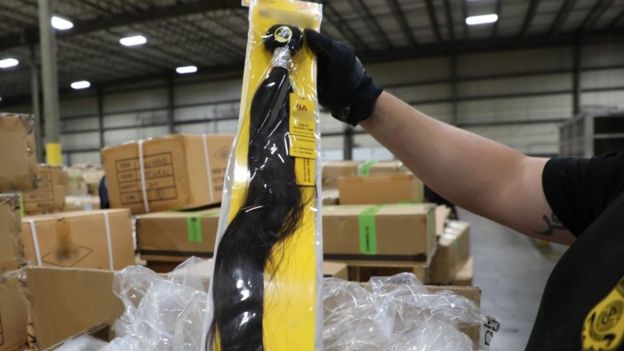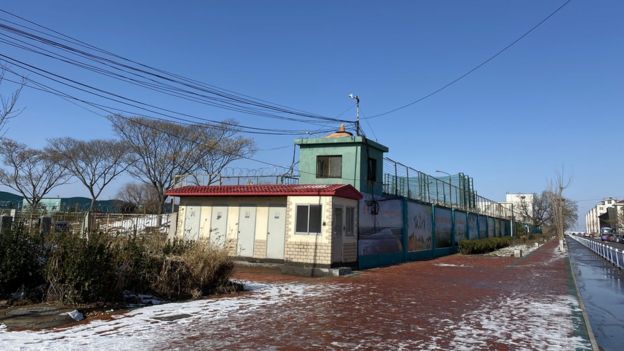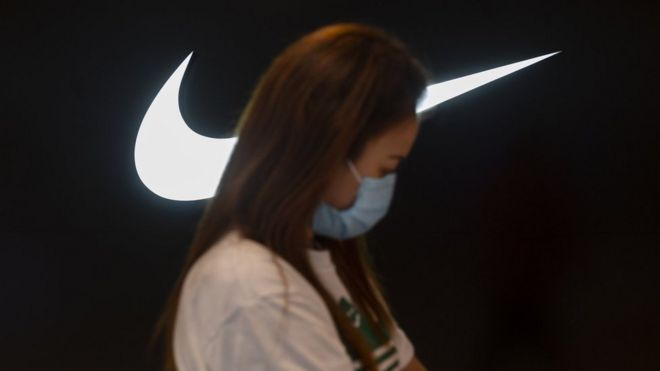Corporate giants including Nike face growing calls to cut ties with suppliers alleged to be using "forced labour" from China's Uighur people.
Activists have launched a campaign accusing firms of "bolstering and benefiting" from exploitation of the Muslim minority group.
The US has also ramped up economic pressure, warning firms against doing business in Xinjiang due to the abuses.
Nike and other brands have said they are tracking the issue.
Nike said it was "conducting ongoing diligence with our suppliers in China to identify and assess potential risks related to employment of Uighur or other ethnic minorities".
It said it does not source materials directly from Xinjiang, the region in western China that is home to much of the country's Uighur population and many of the factories said to use the labour.
Apple also said it had investigated the claims. "We have found no evidence of any forced labour on Apple production lines and we plan to continue monitoring," the firm said.
Politicians and activists say companies need to do more if they do not want to be complicit in the Chinese government's human rights abuses.
"Brands and retailers should have left long ago, but they haven't and that is why this public call to action is important and necessary," said Chloe Cranston of Anti-Slavery International, one of the more than 180 organisations involved in the pressure campaign.
"It's not just about ending a relationship with one supplier. It's really about taking a comprehensive approach."
What is happening in Xinjiang?
Reports by the Australian Strategic Policy Institute (ASPI) and the US Congress, among others, have found that thousands of Uighurs have been transferred to work in factories across China, under conditions the ASPI report said "strongly suggest forced labour". It linked those factories to more than 80 high-profile brands, including Nike, Apple and Gap.
China, which is believed to have detained more than one million Uighurs in internment camps in Xinjiang, has described its programmes - which reportedly include forced sterilisation - as job training and education.
Officials say they are responding to risks of extremism and have dismissed claims of concentration camps as "fake".
Omer Kanat, executive director of the Uyghur Human Rights Project, said getting companies to shift business away from Xinjiang is critical to convincing the Chinese government to change its policies.
"Until now, there have been condemnations of what the Chinese government has been doing but there have not been any actions," he told the BBC. "The Chinese government will not do anything unless there are some real impacts, so therefore targeting the companies means a lot."

What are governments doing?
The call for action comes as the US has also ramped up economic pressure over the issue.
This month, it sanctioned Chinese officials overseeing the region and warned firms against doing business in Xinjiang.
American border officials also seized a shipment of 13 tonnes of hair products from the region worth an estimated $800,000 (£628,000), while the Commerce Department blacklisted 11 more companies - suppliers said to work with firms such as Apple - a move that limits the ability of those firms to buy US products, citing abuses.

Lawmakers in the US Congress are considering legislation to explicitly ban imports from Xinjiang, while politicians in the US and in Europe have also threatened legislation that would force companies to monitor the issue more closely.
"Companies all over the world must reassess their operations and supply chains and find alternatives that do not exploit the labour and violate the human rights of the Uighur people," said US congressman James McGovern, who leads a committee on China.
Mr Kanat said he believes an international movement is growing, pointing to recent comments by UK Foreign Secretary Dominic Raab, who accused China of "gross and egregious" human rights abuses and said sanctions could not be ruled out.
"This is encouraging," he said. "It is the first step."
What do the companies say?
The activist campaign is focused on clothing brands because Xinjiang produces the majority of China's cotton, which accounts for about 20% of the world's supply.
Apparel companies said they were taking the issue seriously.
Nike said after it confronted one of its suppliers, Taekwang Group, about the issue, the firm stopped recruiting employees from Xinjiang at one of its factories. The sportswear company said that Taekwang said those workers "had the ability to end or extend contracts their contracts at any time".
"This remains an issue of critical importance," the firm said. "We are continuing to draw on expert guidance and are working with brands and other stakeholders to consider all available approaches to responsibly address this situation."

Gap also said it has policies that bar involuntary labour in its supply chain and does not source clothing directly from Xinjiang.
"We also recognize that a significant amount of the world's cotton supply is grown and spun there," it added. "Therefore, we are taking steps to better understand how our global supply chain may be indirectly impacted."
Other companies disputed the claims that their supply chains were tainted.
Adidas said it had never sourced products from Xinjiang and the company cited in the ASPI report had falsely claimed to be a supplier.
"The adidas workplace standards strictly prohibit all forms of forced and prison labour and are applicable to all companies across our supply chain," it added. "The use of forced labour by any of our partners will result in the termination of the partnership."
Apple said it had not found any issues, despite conducting several surprise audits of its long-time supplier O-Film - one of the firms cited by the US Commerce Department.
Some of the Chinese companies accused of using forced labour from Uighur workers have also disputed the claims.
"We absolutely have not, do not, and will never use forced labour anywhere in our company," said the Esquel Group, a Hong Kong based shirt-maker, reportedly a manufacturer for brand such as Lacoste.
It added that it was "deeply offended" by the US decision to add it to its export blacklist this week.
"We are working with all relevant authorities to resolve the situation, and we remain committed to Xinjiang as we are proud of our contribution in the region over the last 25 years."
Latest Stories
-
Amazon faces US strike threat ahead of Christmas
7 minutes -
Jaguar Land Rover electric car whistleblower sacked
14 minutes -
US makes third interest rate cut despite inflation risk
19 minutes -
Fish processors call for intervention against illegal trawling activities
31 minutes -
Ghana will take time to recover – Akorfa Edjeani
1 hour -
Boakye Agyarko urges reforms to revitalise NPP after election defeat
1 hour -
Finance Minister skips mini-budget presentation for third time
1 hour -
‘ORAL’ team to work gratis – Ablakwa
2 hours -
Affirmative Action Coalition condemns lack of gender quotas in Transition, anti-corruption teams
2 hours -
December 7 election was a battle for the ‘soul of Ghana’ against NPP – Fifi Kwetey
2 hours -
Social media buzzing ahead of Black Sherif’s ‘Zaama Disco’ on December 21
2 hours -
Afenyo-Markin still suffering from the massive defeat – Fifi Kwetey
2 hours -
Retain Afenyo-Markin as NPP leader, he has experience – Deputy Speaker
2 hours -
Kufuor didn’t leave behind a strong economy – Fifi Kwetey
2 hours -
It won’t be business as usual, remain humble – Fifi Kwetey to party members
3 hours

